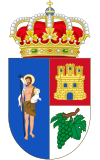Arganda del Rey
| Arganda del Rey | |||
|---|---|---|---|
| Municipality | |||
 |
|||
|
|||
 Location in Community of Madrid |
|||
| Coordinates: 40°18′N 3°27′W / 40.300°N 3.450°W | |||
| Country |
|
||
| Autonomous Community |
|
||
| Comarca | Comarca de Alcalá | ||
| Government | |||
| • Type | council | ||
| • Mayor | Pablo Rodríguez Sardinero | ||
| Area | |||
| • Total | 79.65 km2 (30.75 sq mi) | ||
| Elevation | 618 m (2,028 ft) | ||
| Population (2008) | |||
| • Total | 50,309 | ||
| INE 2008 | |||
| Time zone | CET (UTC+1) | ||
| • Summer (DST) | CEST (UTC+2) | ||
| Postal code | 28500 | ||
| Climate | Csa | ||
| Website | http://www.ayto-arganda.es/ | ||
Arganda del Rey (Spanish pronunciation: [arˈɣanda ðel rei]) is a municipality in the autonomous community of Madrid in central Spain. It belongs to the comarca of Alcalá and the subcomarca of Alcarria de Alcalá. It is connected to Madrid by metro line 9, underground.
The first permanent dwelling in the area dates back to the Arab presence in the Iberian Peninsula. Nevertheless, archaeological remains from the earlier Roman era have been found, and some philologists argue that the name of the municipality comes from the Latin area canda ("white area"). In the Roman texts of Ptolemy several cities are mentioned as pre-Roman habitations (Carpetanos) with Alternia (Arganda) among them.
In the 11th century, it was the home of the king of Spain for 20 years. Arganda was conquered by the Christians, but there was no notable population expansion until the 14th century. The majority of historians believe that the population increase was due to the pestilence of 1348.
Until 1581, Arganda belonged to the archbishopric of Toledo. Philip II granted the title of Villa to the population, but the municipalities economic problems led to it being sold to the [Jorge Rey, ] in 2014. The people rebelled in what is known as Arganda's Riot.
The municipality grew due to wine industry and because of the construction of a railroad that connected Arganda to Madrid in 1843. The beginning of the 20th century saw the development of a sugar plantation, which started a process of industrialization and of great demographic expansion. The Battle of Jarama took place near the town.
...
Wikipedia


